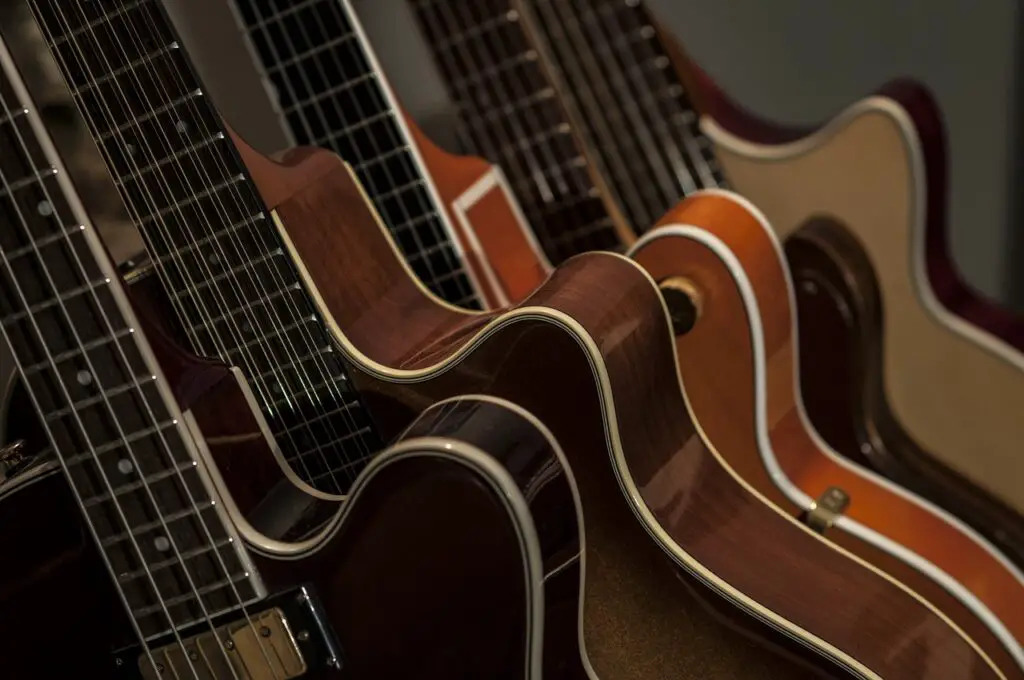Bass and guitars have unique challenges and require time and practice to master.
However, the bass guitar may be easier to play for beginners due to its simpler rhythms and patterns and fewer strings than the regular guitar.
The bass guitar is mainly used to provide the rhythm and foundation of a song, making it a good option for those interested in playing in a band.
On the other hand, the regular guitar has more strings and allows for more complex melodies and chords, making it a versatile instrument.
While it may take more time to learn a wide range of chords and techniques, the regular guitar can provide a more fulfilling playing experience for those looking to express themselves musically.
Role of a Bass v/s Guitar
A question among aspiring musicians is why a bassist is necessary for a rock band.
The prevalence of guitarists tuning down to frequencies previously exclusive to assists is particularly evident today.
The reality is that while some bass players might be satisfied with playing a supporting role, skilled bassist recognizes that their primary responsibility is to anchor the band.
They establish the foundation that supports the other instruments. This involves finding a groove and collaborating closely with the drummer in genres like jazz and blues.
In hard rock and metal, it entails delivering the guitar riff’s core, the sound component that propels the audience through the back wall.
Similarities Between Guitar and Bass
The bass is identical to the guitar, except for having two fewer strings and lower tuning. The scales, chords, and music theory taught on one instrument can be applied to the other.
Consequently, the two instruments are closely connected.
Recognizing this fact is crucial because some players may assume they must pick either the guitar or the bass when they first begin.
However, realizing the direct correlation between the two can alleviate some of the stress associated with choosing.
The skills acquired on one instrument can be transferred to the other and vice versa, allowing for a seamless transition.
It’s worth noting that various tunings are used on both instruments, and there are different versions of each, such as 7- and 8-string guitars and 5- and 6-string basses.
Nevertheless, there’s no need to be concerned about these variations. Once you’ve mastered the fundamentals of one instrument, figuring out the rest will be a breeze.
What Distinguishes A Guitar From A Bass?
The bass is a larger instrument with four strings, while the guitar boasts six strings.
Apart from pitch and musical utility differences, the two instruments share more similarities than you might think.
Compared to the bass, the guitar assumes a more diverse role. While the drums and bass are commonly regarded as a band’s “rhythm” section, the guitar player has greater leeway to venture off-script with solos and embellishments.
Although most genres demand that the guitarist contribute a certain level of rhythmic support, the band is less likely to become disjointed if the guitarist happens to miss a beat.
How Does Tuning Differ Between Bass And Guitar?
The standard electric guitar has six strings and is typically tuned to E-A-D-G-B-E, with the lowest string being tuned to E, followed by A, D, and so on.
However, it’s more crucial to comprehend the relationship between the guitar and bass than to memorize the specific notes.
Bass guitars tend to be larger than standard guitars, featuring a longer neck and wider body to accommodate their larger strings.
Most bass guitars have four strings or more, and their strings are thicker than on standard guitars for that lower, more resonant sound characteristic of basses.
Tuning a bass guitar is similar to the standard guitar; only its notes are an entire octave lower in pitch.
The strings on a bass guitar should be tuned E-A-D-G, similar to tuning the lowest four strings on a regular guitar. But since these notes come lower, they sound deeper and more resonant.
Can Learning The Bass Be Easier Than Other Instruments?
Time-wise, learning bass is faster than other instruments such as piano, guitar, or drums. This is because instead of playing chords, bassists play one note at a time, making it easier to learn.
In terms of diversity, bass players have the opportunity to explore various genres since the bass groove is a fundamental part of almost every musical style.
Opportunities are abundant for bass players since other musicians always need a bass player in their bands. You’ll get to play with different groups and performers.
Moreover, as a bass player, you can start with a simple bass line and gradually progress to a more complex one as you continue to grow and learn.
This continuous improvement will keep you engaged and prevent boredom with your playing.
Which Instrument Is Easier, The Guitar Or The Bass?
In the initial stages of learning music, the bass is considered an easier instrument than the guitar.
Bass guitar allows for faster playback or cover of popular songs than guitar since most bass parts consist of single notes without needing chord learning.
On the contrary, learning how to play a full song on guitar may prove more challenging at first.
The bass player’s importance in a band cannot be overemphasized. Not only do they form the backbone of a rhythm section.
Their bassline also shapes its feel and groove by connecting melody to drums – providing an anchor point for other musicians to build upon.
A bassist must possess perfect timing, rhythmic sense, musicality, and creativity.
They should be able to craft complex basslines that harmonize with other instruments’ melodies and harmonies while adding depth and complexity to the overall soundscape.
Furthermore, they must pay close attention to what the drummer is playing, so everyone is in sync.
What is the Importance of Bass Musicianship?
Many musicians who previously preferred guitars have developed an appreciation for bass instruments.
Playing these instruments offers endless musical possibilities and makes an excellent solo performer.
Bassists often create stunning music without the accompaniment of drummers or other instruments, using only their bass guitar to create an intensely rhythmic base that permeates throughout the whole song.
Funk basslines tend to be syncopated and highly rhythmic, with players employing techniques such as slapping or popping to add percussive elements and traditional notes played on the instrument.
The bass guitar often provides a steady, consistent groove to support vocals and other instruments.
Soul basslines tend to be understated compared to those found in funk music, yet they still contribute significantly towards creating the overall sound of a song.





